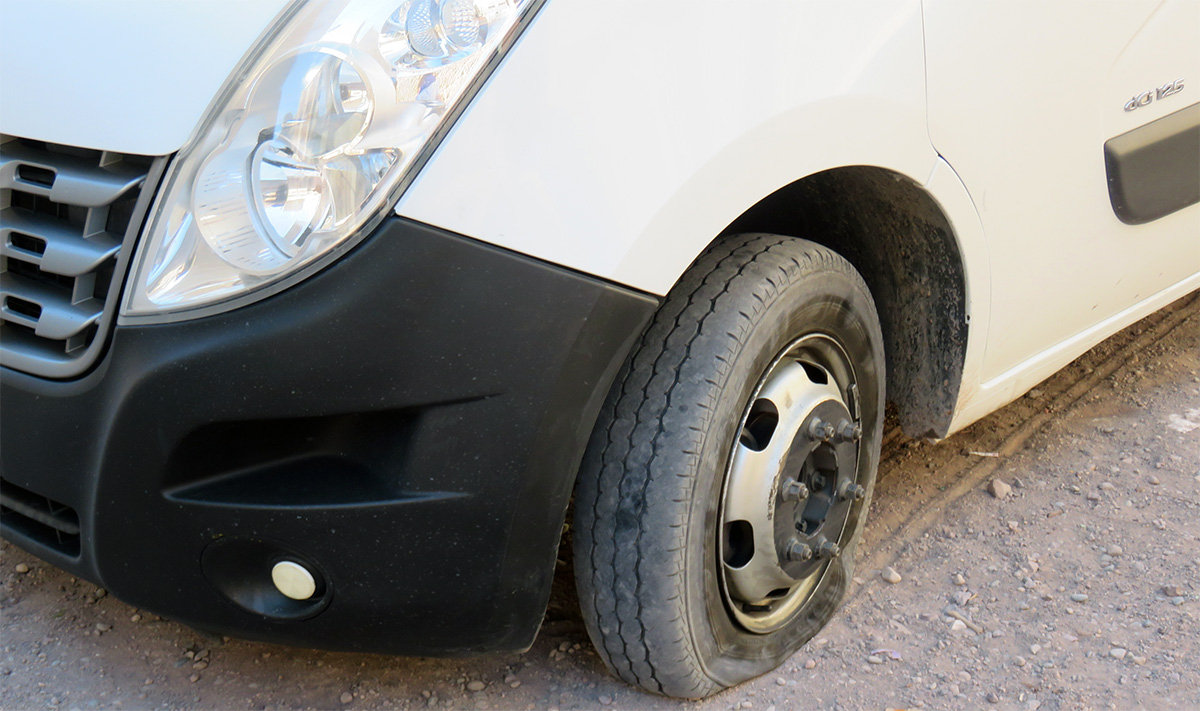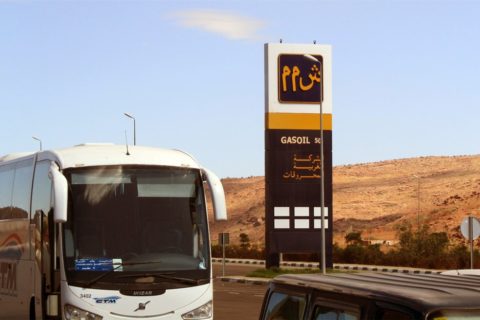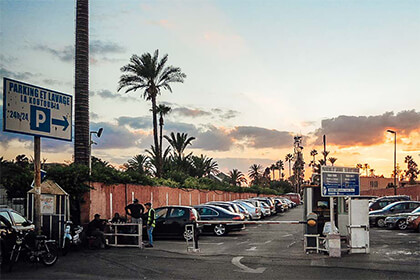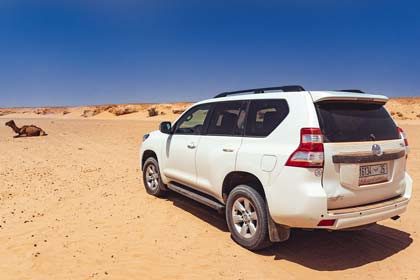Embarking on a road trip through Morocco offers breathtaking landscapes and a unique cultural experience. Your own vehicle allows you to explore remote areas and connect with Moroccan hospitality. In this guide, discover what to expect when driving by car in Morocco.
Whether you’re using a rental car in Morocco or shipping your vehicle to the Maghreb, this page offers valuable information for optimal preparation. Learn how to navigate Moroccan roads safely and comfortably, and take note of tips on petrol stations, fuel costs, highway tolls, and navigation to ensure a smooth road trip.
Contents
- 1 Traffic and Road Conditions
- 2 Driving License and Vehicle Documents
- 3 Traffic Rules: Driving in Morocco Safely
- 4 Petrol Stations and Fuel Costs in Morocco
- 5 Car Rental in Morocco
- 6 Toll Roads
- 7 Navigation and Orientation by Car in Morocco
- 8 Police Checkpoints
- 9 Proper Conduct in Case of a Car Accident in Morocco
- 10 Car Workshops and What to Do in Case of a Breakdown
- 11 Parking
- 12 Hitchhiking in Morocco
- 13 Conclusion: Exploring Morocco by Car is Worthwhile!
- 14 Frequently Asked Questions
Traffic and Road Conditions
Driving in Morocco is generally straightforward. The country has a simple traffic flow with right-hand driving and traffic rules similar to Europe’s. Considerable investments in road infrastructure by the Moroccan government have made even remote places like Erg Chebbi near Merzouga easily accessible.
Roads are well-maintained and adequately signposted in both Arabic and Latin scripts. Distance markers are clearly indicated. However, in some remote and desert areas, roads may be in poor condition, making an off-road vehicle advantageous.
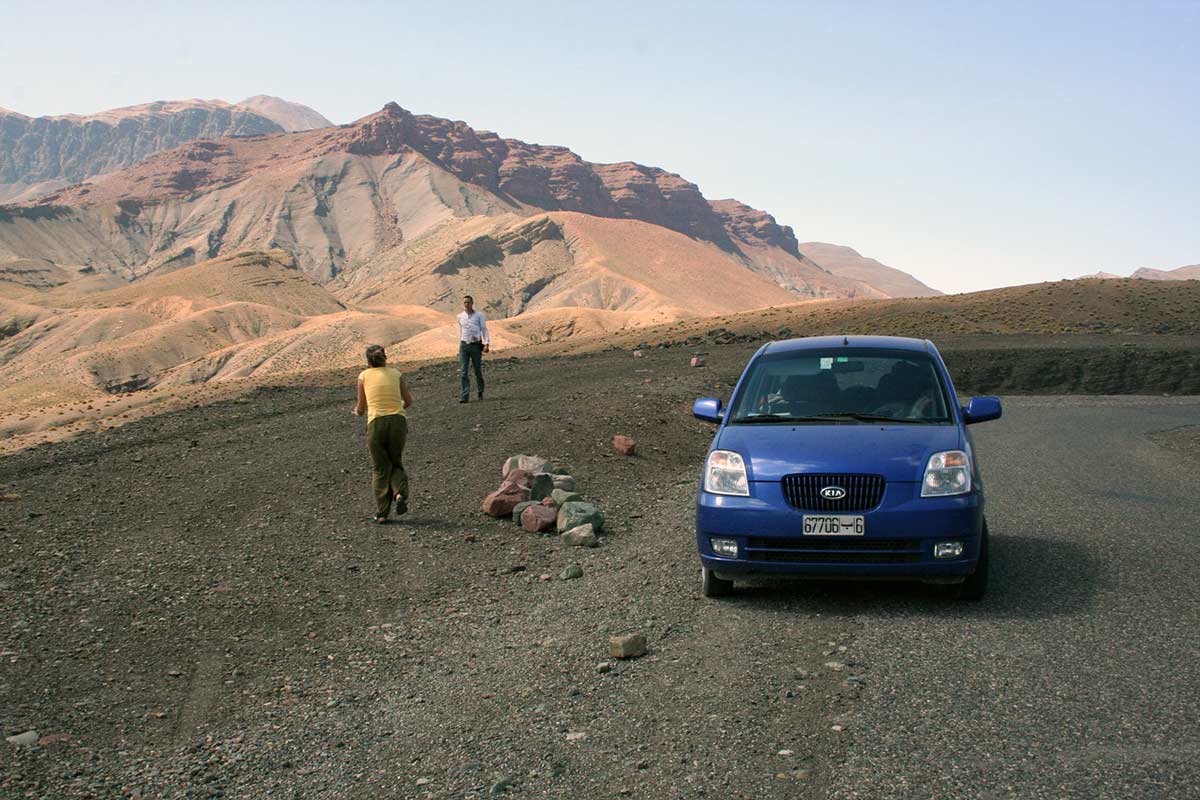
Driving in Morocco requires a defensive approach, especially on rural roads where unexpected obstacles like pedestrians, animals, sand drifts, and potholes may occur. In lively cities like Marrakech, chaotic traffic conditions are expected, with motorcyclists weaving through cars. Always stay in the right lane and be vigilant.
Once you leave bustling city centres, traffic eases. Pay attention to speed limits, especially in villages where the maximum speed is 50 km/h, as many schoolchildren walk or cycle, especially at lunchtime. Driving at night can be challenging, especially in rural areas with street lighting, where pedestrians and cyclists may need lights.
Driving License and Vehicle Documents
To drive in Morocco, you don’t need an international driving license. Your national license is sufficient for stays up to one year. For more extended stays, obtain a Moroccan driving license. Although some travel guides recommend carrying an international driving license, it is not mandatory to drive in Morocco.
If driving your own car to Morocco, carry your vehicle registration document. Also, be aware of the mandatory liability insurance in Morocco. Some motor insurance policies exclude coverage for specific countries, so at the border, consider obtaining short-term liability insurance to ensure adequate coverage for your vehicle.
A “Carnet de Passages” for the temporary duty-free import of vehicles is not required. Handle all necessary declarations for the temporary import of your car directly with customs officers on ferries or at border crossings.
Traffic Rules: Driving in Morocco Safely
Generally, traffic rules in Morocco are similar to those in Europe, and road signs are very similar. Therefore, as long as you adhere to traffic regulations, you should have no issues.
Alcohol
It is strictly prohibited to drive under the influence of alcohol in Morocco. Violations of the alcohol ban while driving incur severe penalties, and a zero-tolerance policy is strictly enforced. I unequivocally recommend never driving under the influence of alcohol in Morocco.
Traffic Lights and Right of Way
Traffic signals in Morocco have slightly different meanings than in Europe. Red means stop, while green signals proceed. Yellow has a different meaning compared to our traffic rules; when the light turns yellow, you must also come to a stop. Additionally, slow down at green lights.
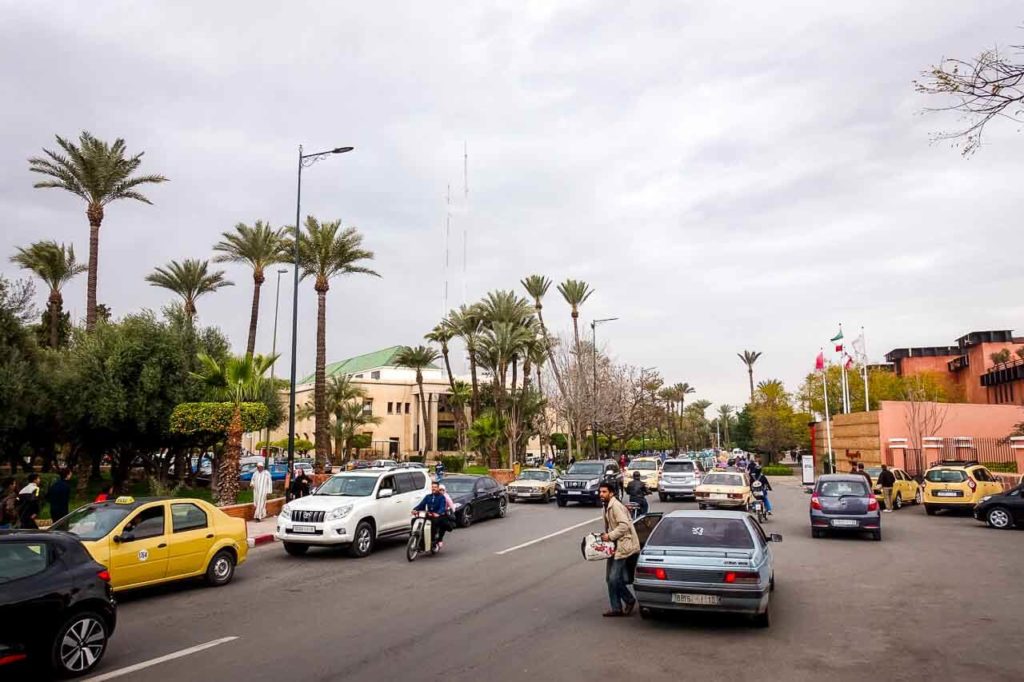
In Morocco, the right-of-way principle applies at intersections unless different rules are indicated by road signs before the roundabout. Traffic police often monitor roundabouts. The police regularly use radar guns to check for speeding violations. Always adhere to the allowed speed limit, especially when approaching checkpoints and roundabouts. The police are strict about speeding violations, imposing hefty fines.
Speed Limits
Various speed limits apply in Morocco, so ensuring your safety and compliance with traffic rules is crucial. In urban areas, the maximum speed is typically between 40 and 60 km/h, depending on the city. On rural roads, the speed limit ranges from 60 to 80 km/h. Some well-maintained rural roads allow speeds of up to 100 km/h. On highways, you can travel at speeds up to 120 km/h.
Overtaking
Vehicles wider than 2 meters or longer than 7 meters (including trailers) must reduce speed and, if necessary, stop on narrow roads to allow other cars to overtake or pass. Many Moroccans use their turn signals to indicate when it’s safe to overtake.
Stopping and Parking
Parking is not allowed in certain situations. Avoid parking on hills, under viaducts, or in tunnels. Parking along road sections with red-and-white markings is prohibited. Ensure you don’t park within 10 meters before an intersection in built-up areas and 5 meters outside. Additionally, designated parking spaces for disabled people are reserved and identifiable by international traffic signs.
Mobile Phone Use
While driving, use your phone exclusively with a hands-free device. Using mobile phones without hands-free devices significantly increases the risk of accidents. Therefore, it’s advisable to use them only when absolutely necessary. Note that violations can result in fines of up to 8000 DH (730 EUR).
Child Seats
When travelling with your family, ensuring the safety of all, especially children, is crucial. Traffic accidents are among the leading causes of child fatalities, making it essential to use appropriate child safety seats for car journeys in Morocco. Before reserving your rental car, check with the car rental company if child seats are available to avoid purchasing your own.
Stay tuned for the second part of the guide, covering petrol stations, fuel costs, renting a car in Morocco, toll roads, and navigation tips.
Petrol Stations and Fuel Costs in Morocco
Refuelling in Morocco is straightforward due to the abundance of petrol stations. You’ll find well-known oil companies such as Shell, BP, Total, Texaco, and the reliable local chain Afriquia. Despite the dense network of petrol stations, it’s advisable to refuel before long journeys in rural areas, as occasional fuel shortages may occur in remote regions. There have been reports of small petrol stations near Merzouga possibly not selling pure petrol.
Paying with a card is often possible at larger petrol stations, but cash is usually preferred. Therefore, it’s wise to always have sufficient money on hand. Petrol prices in Morocco are significantly lower than in Europe. In October 2023, the price per litre of diesel was 1.14€, while petrol was 1.12€. However, these prices may vary by region. Petrol in Western Sahara tends to be even more affordable due to the absence of fuel taxes.
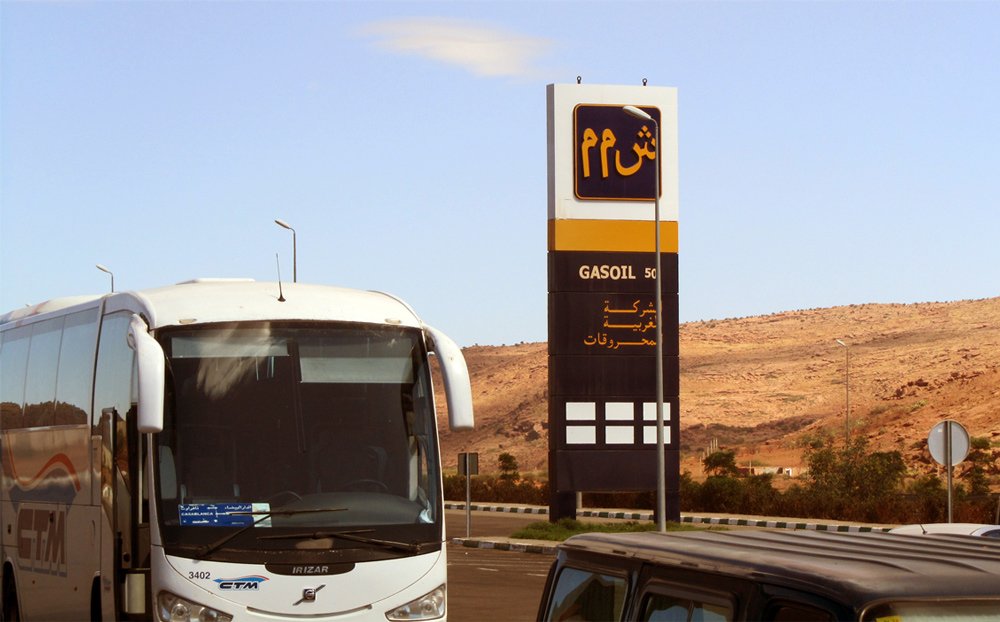
There is no self-service at petrol stations. Friendly attendants handle the service, and they appreciate a small tip of 5-10 DH. Give them your key and tell them the type of fuel you want, often “sans plomb” (unleaded). You can decide whether to fill up for a fixed amount or a full tank.
When entering Morocco, declare fuel in reserve canisters at customs.
Car Rental in Morocco
If you plan to rent a car in Morocco, it’s best to do so in one of the larger cities, especially if you’re flying into Morocco, as most car rental companies have airport branches. This includes international car rental companies like Avis, Hertz, Europcar and Moroccan firms like Medloc Maroc.
Differences usually exist in insurance and excess. Ensuring that the available mileage suits your planned trip in Morocco is essential. I always book my rental car through Rental Cars. The platform compares various providers, including Moroccan ones.
When booking a rental car through an online portal, consider adding insurance without excess to avoid paying anything in case of damage. A rental car with full insurance coverage costs around 180 EUR per week, depending on the model.
Toll Roads
Morocco’s vast land area results in considerable distances between significant cities and regions. During a road trip through Morocco, you’ll often cover substantial distances, and travel times increase due to the average speed on regular roads being around 60 km/h. In contrast, driving on Moroccan highways is much more relaxed and significantly faster.
When covering long distances, using toll roads can provide a more relaxed journey and considerable time savings.
Comparison of travel times between cities in Morocco on regular roads and highways:
- Marrakech to Casablanca – 242 km (2:45 hrs instead of 4 hrs)
- Marrakech to Rabat – 323 km (3:30 hrs instead of 5:15 hrs)
- Marrakech to Fes – 525 km (5:40 hrs instead of 7:30 hrs)
- Casablanca to Fes – 289 km (3:15 hrs instead of 4:50 hrs)
- Agadir to Marrakech – 252 km (3 hrs instead of 4 hrs)
Navigation apps and route planners usually recommend toll highways by default, labelled as “Autoroutes” and marked with the ‘A’ symbol.
Toll Roads in Morocco
- A1: Rabat – Tanger
- A2: Rabat – Fes, Fes – Oujda
- A3: Casablanca – Rabat
- A5: Casablanca – El Jadida
- A6: Tétouan – Fnideq
- A7: Casablanca – Marrakech, Marrakech – Agadir
Paying the toll for your car in Morocco:
Automated machines are available at each entrance to purchase a toll card. A toll booth is operated at each exit, where someone checks the ticket. Costs depend on the vehicle class and distance travelled. Compared to Europe and the USA, tolls are reasonably priced. For example, the 205 km route from Tanger Med to Kenitra Nord costs 178 DH (approx. 16 EUR). You can calculate around 8 EUR per 100 km.
You can pay toll fees in Morocco at the machine if you buy a card before entering the highway. However, Morocco also has a system called JAWAZ (website in French), where you can pay toll fees without purchasing a card beforehand. With this telemetric system, you don’t need to operate machines; you drive slowly through a designated area where your vehicle is registered.
Since most cars do not have integrated navigation systems, smartphone use is a practical solution. If you don’t have internet access, offline maps from apps like OSMand or Maps.me can be handy.
Alternatively, you can use Google Maps with a SIM card with mobile data. SIM cards are widely available and very affordable in Morocco. I recommend Maroc Telecom SIM cards, but those from Orange Maroc and Inwi work well too. The mobile network in Morocco is reliable, even in remote areas.
For more information on mobile internet and SIM cards in Morocco, many self-drivers also appreciate a traditional road map, especially for on-the-go trip planning. The most up-to-date and recommended road map for Morocco is the Michelin Map 742.
Police Checkpoints
Traffic checkpoints are common in Morocco, especially on main roads leading to major cities. Other drivers often signal with lights to warn of checkpoints.
If you encounter a checkpoint, you must stop. Look for the “Gendarmerie Royale” sign. Wait for the police officer to signal you to proceed or to pull over. Foreign tourists in rental cars are usually waved through, but occasionally, you may need to present documents, including vehicle registration and insurance papers. Be polite and answer the officers’ questions for a smooth continuation.
Penalties for offences such as not wearing seat belts (even in the back seat) or not signalling when changing lanes can be quickly and on the spot, with fines of up to 450 DH. Tickets are handed to you directly.
Proper Conduct in Case of a Car Accident in Morocco
Always call the police in case of an accident with injuries, and do not sign an accident report without translation. In case of an accident, get the police report number and request a copy. Otherwise, there may be problems at the border during departure (suspicion of hit and run). If you, as a foreigner, are involved in an accident, report the incident to the Bureau Central Marocain des Sociétés d’Assurances.
For accidents with minor property damage, an amicable settlement is also possible. It is recommended that you fill out an accident report. You can buy the form (constat amiable d’accident) at kiosks and tobacco shops.
Car Workshops and What to Do in Case of a Breakdown
Even with good vehicle maintenance, unexpected problems can occur. In case of a breakdown, move your car safely to the side of the road to avoid disrupting traffic.
Contact your car rental provider for assistance. Check if the breakdown coverage is valid abroad if travelling with your car. Please do not attempt DIY repairs for rental vehicles, as car rental companies usually provide roadside assistance. Alternatively, you may find a local automotive mechanic to help with essential maintenance. Moroccan mechanics are generally competent. You can often find small workshops in most towns, but obtaining spare parts can sometimes take time, especially for non-French cars. If there is no workshop nearby, try to organize a tow service from a truck driver for a fee.
Parking
In many city centres and popular tourist attractions, official and private parking attendants offer to watch your car. Upon your return to the car, giving these helpers 5-10 DH is customary for their services.
Along the streets, you will find parking bays with meters allowing you to park for one to two hours. On Sundays, parking is usually free. Parking attendants, recognizable by their blue overalls and the name “Gardiens de Voiture,” monitor these parking lots. If you want to leave your car for a more extended period, look for parking garages near facilities and attractions. Note that parking on red and white striped curbs should be avoided.
Hitchhiking in Morocco
Hitchhiking in Morocco is common, as only some have their own car. Travelling through the country, you often see people on the roadside looking for a ride, especially in remote areas like Merzouga, Zagora, and Tafraoute.
There are mixed opinions about hitchhiking in Morocco. Some warn against picking up hitchhikers, as it may lead to unwanted situations, such as an unplanned visit to souvenir shops or carpet stores. On the other hand, hitchhiking, especially in remote regions, plays a crucial role in everyday mobility and provides an opportunity to help a fellow traveller and make interesting acquaintances. Whether you pick up a hitchhiker depends on your comfort and safety feelings; it is always your decision.
Conclusion: Exploring Morocco by Car is Worthwhile!
Morocco is a fantastic destination for a road trip with your own vehicle or a rental car. Driving requires a high level of attention, especially in major cities, and traffic and its rules differ only a little from Europe. The road infrastructure has been continuously improved in recent years, so with the proper preparation, you can have a safe and exciting journey and reach places off the beaten path.
Frequently Asked Questions
Prices for a rental car in Morocco with full insurance coverage start at 180 EUR per week, depending on the model, from Rental Cars.
A national driver’s license is sufficient for stays of up to one year. A Moroccan driver’s license is required if your stay is extended by more than a year.
Using toll highways in Morocco costs approximately 8 EUR per 100 km distance.

